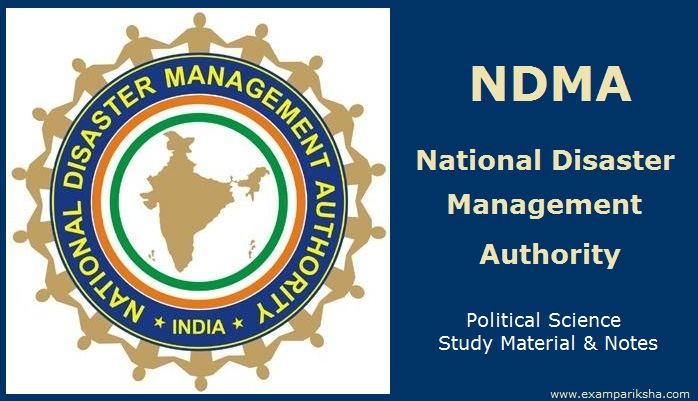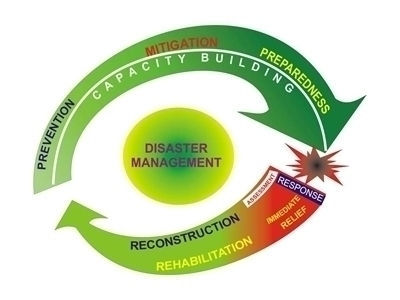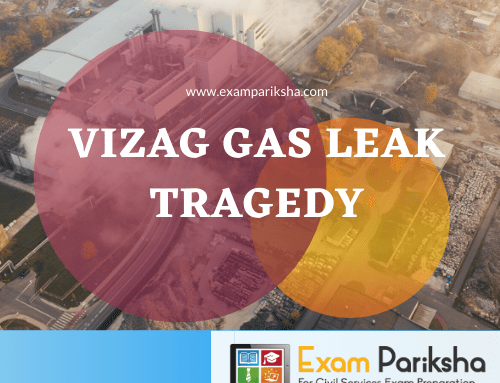National Disaster Management Authority (NDMA) – Political Science Study Material & Notes
The National Disaster Management Authority is a Home Ministry Agency. The Government of India enacted the Disaster Management Act in 2005, which mandated the establishment of a National Disaster Management Authority (NDMA) for coordinating response to disasters and for capacity building in crisis response and disaster resiliency.
The NDMA is headed by the Prime Minister(as ex-officio Chairman). While the State Disaster Management Authorities (SDMA) are headed by their respective Chief Ministers. The NDMA is created to drive and implement a holistic and integrated approach to Disaster Management in India.
29 September is celebrated as the Foundation Day of the NDMA. Recently, on the 10th foundation day of the NDMA, the Home Minister has said that the National Disaster Management Authority will be revamped to make the functioning of the agency effective.
Evolution of NDMA:
The National Disaster Management Authority was a brainchild of the two Committees- High Powered Committee setup in 1999(in recognition of the importance of Disaster Management as a national priority issue). Thereafter, A separate National Committee was setup after the Gujarat Earthquake.
These two Committees made recommendations on the preparation of disaster management plans and suggestion mitigation measures.
Furthermore, in the Tenth Five-Year Plan contained a chapter on Disaster Management.
In pursuit of the recommendations made by these bodies, the government enacted the Disaster Management Act in December 2005.
Composition of National Disaster Management Authority(NDMA):
- The NDMA has a sanctioned strength of nine members.
- The Chairman is the Prime Minister of India, as the de-facto head.
- To oversee the day-to-day affairs of the NDMA, the Vice _chairman is appointed.
- Ever since its inception, the NDMA has been manned by non-experts who were politically affiliated to the Government.
- Recently, the Government has appointed three experts in the Disaster management Agency. These members are related to the field of Disaster Management, these esteemed members are:-
- Dr. D.N. Sharma, Director, Health Safety and Environment Group, BARC
- Shri Kamal Kishore, Programme Advisor at UNDP, New York
- Lt. Gen. N.C. Marwah, PVSM, AVSM (Retd.)

Organisation of NDMA:
The National Disaster Management Authority is organised in following divisions for operational divisions:
- Planning and Policy
- Mitigation
- Operations and Communication division
- Administration division
- Capacity Building Division
- Finance Division
Objectives of National Disaster Management Authority:
- The NDMA envisions a safer and disaster resilient India.
- The objectives of NDMA are to ensure a holistic, pro-active, technology driven and sustainable strategy which would involve all stakeholders.
- It tries to foster a culture of prevention, preparedness and mitigation.
Functions of National Disaster Management Authority (NDMA):
The NDMA is mandated to lay down effective policies, plans and guidelines for Disaster Management. This is expected to ensure timely and effective response to disasters. To achieve this objective, the NDMA fulfills the following functions:
- Lays down policies for management of disasters.

- Approve the National Plan for Disaster Management
- Approve the plan prepared by the ministries/ Departments of the Government of India according to the National Plan.
- It lays down guidelines for integrating the measures for prevention of disaster by different Ministries/Departments of Government of India.
- It also issues guidelines for mitigation of the effects of disaster in the development plans of these Ministries/Departments.
- The NDMA lays down guidelines that are to be followed by the State Authorities in drawing up the State Plan.
- The NDMA coordinates the enforcement and implementation of the plans and policies for disaster management.
- It recommends the provisions of funds for mitigation of disasters.
- The NDMA provides support to other nations that are affected by major disasters, this is determined by the Central Government.
- The National Disaster Management Authority also takes measures for prevention of disasters, their mitigation, preparedness and capacity building for dealing with threatening disasters or disaster situations.
- the NDMA lays down wide policies and guidelines that may be required for the functioning of the National Institute of Disaster Management .
<< Read about the mechanism of Earthquakes here >>





